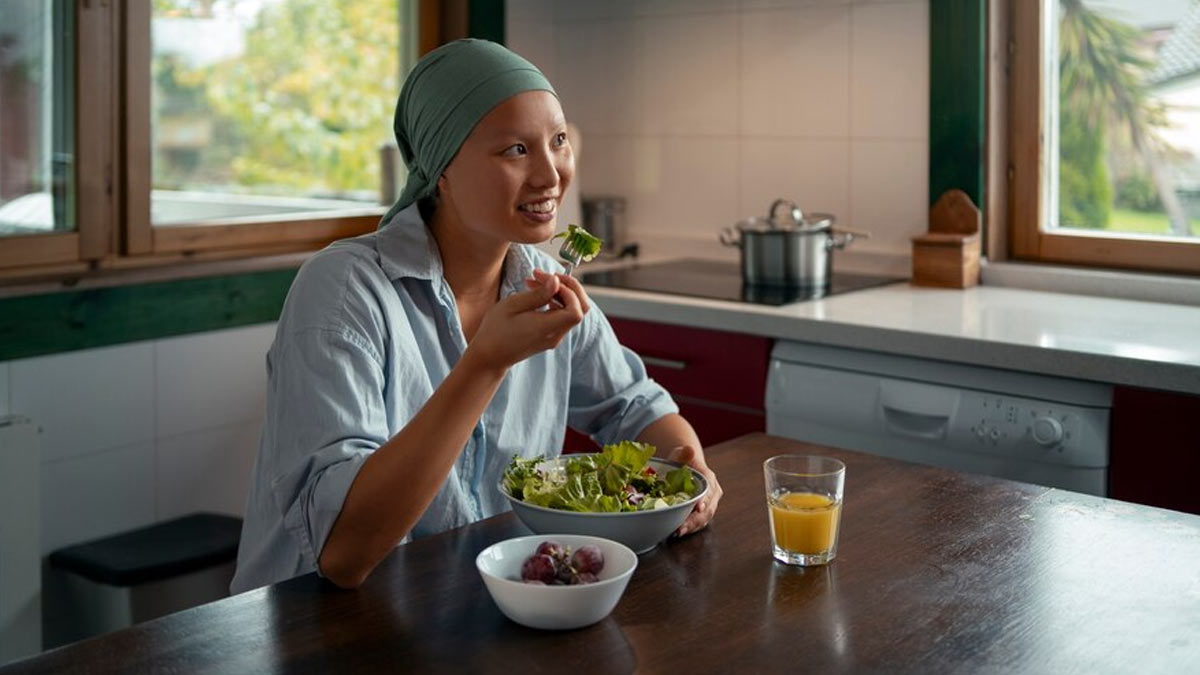
As per data from the World Health Organization, around 1 out of every 5 individuals experience cancer during their lifetime, with roughly 1 in 9 men and 1 in 12 women succumbing to the illness. Well, when someone is battling cancer, their entire focus often shifts towards treatment and recovery. Amid this challenging journey, the importance of maintaining healthy eating habits can sometimes be overlooked, highlights Dr Sushrut Pownikar, who is the Head Of Quality Assurance and Deputy Director at Oncquest Laboratories.
Table of Content:-
A healthy diet and lifestyle can significantly reduce the risk of common cancers. A healthy diet can help prevent chronic conditions that increase the risk of cancer, while genetics and other health conditions are more out of our control. Focusing on the big picture and focusing on the foods we choose to fuel our body can help minimize cancer risk.
Importance of Diet in Cancer Recovery
As per Dr Pownikar, “Nutrition plays a crucial role in supporting the body during cancer treatment, aiding in recovery, and mitigating treatment-related side effects. The journey through cancer treatment is undoubtedly tough, but with the right dietary choices, individuals can enhance their strength, resilience, and overall well-being.”
Also Read: Lifestyle Choices That Reduces The Risk Of Cancer
Importance of Healthy Eating Habits During Cancer Treatment
Throughout the course of cancer treatment, individuals often encounter a myriad of dietary challenges. The illness itself, coupled with the rigors of treatments like chemotherapy and radiation therapy, can significantly impact one's appetite, taste preferences, and ability to consume certain foods. As a result, maintaining adequate nutrition becomes a cornerstone of comprehensive cancer care.

Dietary suggestions for optimal health
“Incorporating a diverse array of nutrient-rich foods into one's diet is paramount for supporting overall health and well-being during cancer treatment,” suggests Dr Pownikar. Emphasizing whole grains, lean proteins, fruits, and vegetables can provide the body with essential vitamins, minerals, and antioxidants necessary for bolstering immunity and promoting healing.
Additionally, staying hydrated by consuming ample fluids is crucial for mitigating the risk of dehydration, particularly in the face of treatment-induced side effects such as diarrhoea and vomiting.
To maintain weight and lower cancer risk, it is recommended to eat more fruits and vegetables, as the pigment in fruits and vegetables may contain ingredients that reduce cancer risk.
Consuming smaller, frequent meals and avoiding bland, easily digestible foods can help alleviate gastrointestinal distress and promote nutritional intake despite diminished appetite.
Also Read: Dietitian's Guide On What To Eat During Cancer Treatment
What To Avoid
To minimize the risk of foodborne illnesses and support immune function, it is advisable to steer clear of certain foods during cancer treatment. Raw or undercooked seafood, unpasteurized dairy products, and unwashed fruits and vegetables should be avoided to reduce the likelihood of bacterial contamination. Similarly, highly processed and fried foods laden with unhealthy fats may exacerbate inflammation and compromise overall health, making mindful food choices all the more imperative.
Furthermore, receiving a cancer diagnosis is undoubtedly a life-altering experience. From the moment of diagnosis, individuals embark on a journey fraught with challenges, uncertainties, and difficult decisions. Despite the daunting nature of cancer treatment, maintaining healthy eating habits is not just about sustenance—it's a powerful tool in the fight against cancer.
In a nutshell, cancer treatment is a multifaceted journey that extends beyond medical interventions to encompass holistic approaches to healing. By prioritizing healthy eating habits, individuals undergoing cancer treatment can empower themselves to combat the disease with resilience and fortitude. Also, consult your doctor or a cancer specialist dietician to tailor dietary recommendations to your specific needs and treatment plan. Their expertise can provide invaluable guidance on navigating the complexities of nutrition during cancer treatment.
Also watch this video
Read Next
Kate Middleton Reveals Cancer Diagnosis, Undergoing Preventive Chemotherapy; Here’s What It Is
How we keep this article up to date:
We work with experts and keep a close eye on the latest in health and wellness. Whenever there is a new research or helpful information, we update our articles with accurate and useful advice.
Current Version